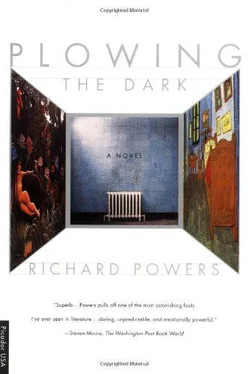It occurred to Steve that he could now probably beat the man at handball. "They say it can go into remission."
"Do they? What do they say about the chance of a doctor of music composition getting a job anywhere on the face of the planet?"
"Is he close to finishing?" Something to say, however feeble.
"Oh, any year now. Steve, it's unbelievable." Opposites mixed freely in her voice. "All the man wants to do anymore is compose."
"Does he still… ?" Spiegel began. But decency forced him to pull over before someone got hit.
"No. Nothing. Just sits there and writes music."
"Is any of it getting played?"
"Stevie, Stevie. What planet are you living on? Our apartment was broken into five months ago? The thieves took everything that wasn't nailed down. Except for the man's classical music collection."
"Is he at least…happy?"
"What a quaint question. Nice to know that at least one of us hasn't changed since college."
"You're still painting, aren't you?"
"Guilty. But at least I'm holding down a real job. Official table busser to the art elite." She admitted to still putting together a portfolio, however much she declared her readiness to cave in to the world's terms.
Her tone was too much for Spiegel. He wished he'd never called. "Let me know when you mount your show. And tell Thaddeus to give me a ring sometime."
She never did let him know. But Zimmerman did call, years too late, after Spiegel had signed on to work with TeraSys, surrendering to the century's terminal art form. Ted did call, after Steve could no longer imagine how far the man's body had decayed. He called from Lebanon, a flyspeck in the wastelands of southwestern Ohio. An old Shaker town, site of one of Mother Ann's visionary communities, waiting celibately up on a bluff for the world's redemption and wrap-up. A town whose chief industry had once been utopianism but was now the nearby close-security prison.
Ted was well. He was working. Oh: and he was also employed.
He had a job in that same prison, part of a four-year private college's outreach program, granting bachelor's degrees to convicted rapists, arsonists, and murderers. He had gone out on the market for a few years' running and had come close to landing a post in Utah. But the Mormons had not bought his cultural analysis of Das Lied von der Erde. So he ended up in the ruins of millenarian Warren County, teaching Rudiments of Theory and World Culture 1 and 2 to the incarcerated underclass of Dayton, Columbus, and Cincinnati.
What exactly was World Culture 1?
He wasn't entirely sure, but if Spiegel had any suggestions, he was willing to try anything once. He rather enjoyed it when 300-pound men with diagonal keloids across their faces could identify the start of a secondary theme group. And get this: the recidivism rate for the prison as a whole was 48 percent. For those who completed a degree, it dropped to 12.
Cause and effect?
More likely, those who could stomach World Culture for a couple of semesters were already those who had steeled themselves to the idea of life on the outside.
Job security?
Twenty to life. No reduction for good behavior.
How was he getting around?
Slowly. In a wheelchair.
Where was Adie?
Zimmerman was not quite sure. Still in New York, he thought. She'd had a show, while they were still living together, at a reputable SoHo gallery. The work had been written up, talked about in all the appropriate circles. It looked as though the art mafia were going to let her play.
Then she'd panicked. She took back the couple of works that had sold at the show, paying the gallery their commission plus a makeup fee to the buyers. She rejected the gallery's offer to think about a more casual, long-term relationship. Refused to keep the door open, even in the abstract. She held a bonfire. Ted wasn't sure how many works she burned, but the casualties were high and the ones that burned best were by far her most accomplished.
She'd started to freelance. Junk, Ted called it. Commercial design. Coffee-shop walls. Health-club logos. Ad circulars for fake New England mail-order houses.
At the time, Ted's own CV was coming back unopened from every academic job offering in the country. The MS was in remission, and he was pouring all temporary strength into a large-scale piece — a concerto for piano and orchestra. He was playing beat the clock, working away seven or eight hours a day on the concerto, and the hopeless effort was driving Adie up the wall. He should have been out doing something about his job odds, she said. When he asked her what that might entail, she grew even angrier.
She came to him with an ultimatum. Either he start looking for real work or they were history. He told her he'd always enjoyed history. So she split, leaving him only a P.O. box for a forwarding address.
Had he tried to contact her?
Had not and would not. Not good for either of them. She needed to be free of him. He made her feel guilty.
And she made him feel…?
He'd never really stopped to consider.
He was still writing music?
This was the extraordinary compensation. Just as all hope was walking outthe door, salvation blew in the window. Spiegel knew about computers? He made a living with them? Then he knew all about the first significant change in the production of music since Pan carved his
pipes.
Zimmerman had no clue how any of it worked. Some digital necromancer, probably Asian, had taken the sound of a real clarinet, sliced each second of the waveform into forty-four thousand pieces, and pushed each of those pieces down into silicon. From there, the reed could be recalled at any pitch, duration, or intensity.
Not a perfect clarinet, mind you. Or rather, a tad too perfect. But Zimmerman wasn't about to quibble over sound quality. He had his Esterhazy in a box — every instrument of the orchestra at his beck and call, around the clock, each one capable of playing beyond the range of earthly instruments. He scored out music on the screen, just as he did on paper, and the miraculous music box performed every aural event he cared to specify.
The possibilities outstripped not only his wildest expectations but also his wildest ability to expect. For the first time in his life, Ted could hear the contour of his thoughts as he thought them. The tireless box played a presto stream of hemi-demi-semiquavers all day long without hobbling a note or pausing to breathe.
He set aside all concern for the possible and began to compose the music he most wanted to hear. The box realized anything that Zimmerman could describe to it. He wrote a piece for twelve piccolos in narrowest brilliant tessitura. He wrote a sonata for cello and piano that kept the piano in a perpetual pianissimo and never let the cello out of murderous thumb position. He wrote a frenetic solo for bass clarinet, thirty thousand high-speed notes leaping and crashing through all registers so jaggedly that no human could dream of bringing it off. He played the piece for Spiegel over the phone. Even through the tiny acoustical portal, the effect was dizzying.
Once Spiegel opened the channel, the phone became Ted's favorite obbligato instrument. If the thing rang in Seattle any time before eight in the morning or after midnight, odds were good that the voice at the other end would kick things off with a cheery "Lebanon, here!" A call might last the better part of an hour, Ted ecstatic with computers? He made a living with them? Then he knew all about the first significant change in the production of music since Pan carved his
pipes.
Zimmerman had no clue how any of it worked. Some digital necromancer, probably Asian, had taken the sound of a real clarinet, sliced each second of the waveform into forty-four thousand pieces, and pushed each of those pieces down into silicon. From there, the reed could be recalled at any pitch, duration, or intensity.
Читать дальше












